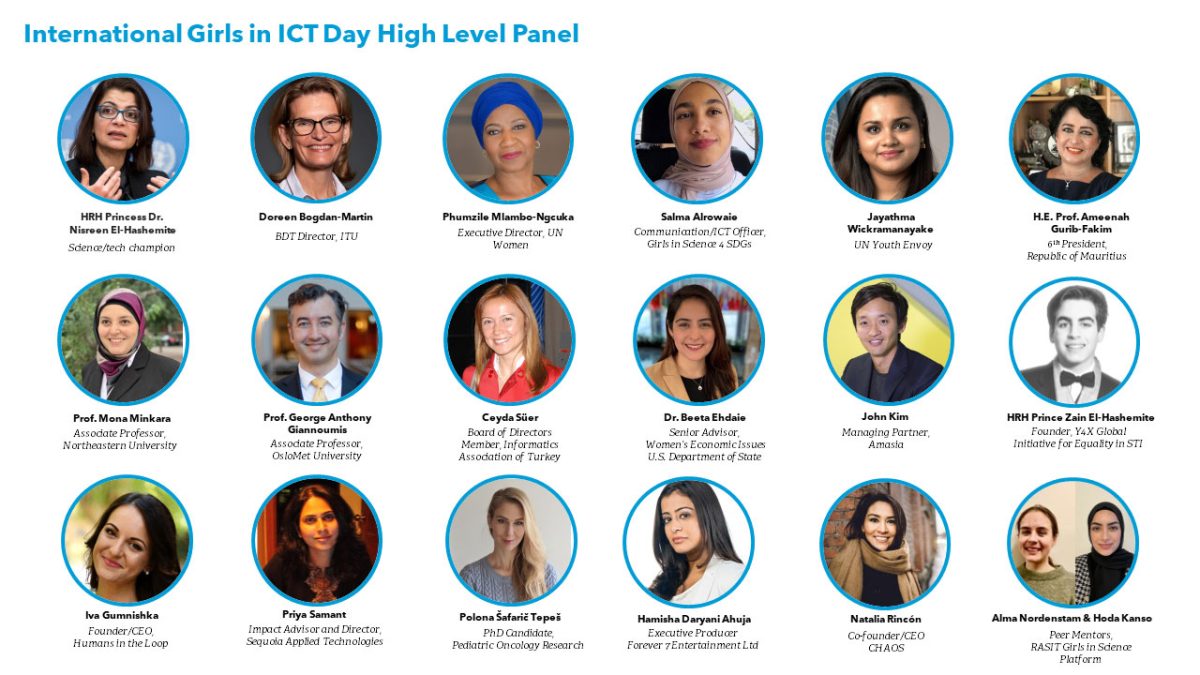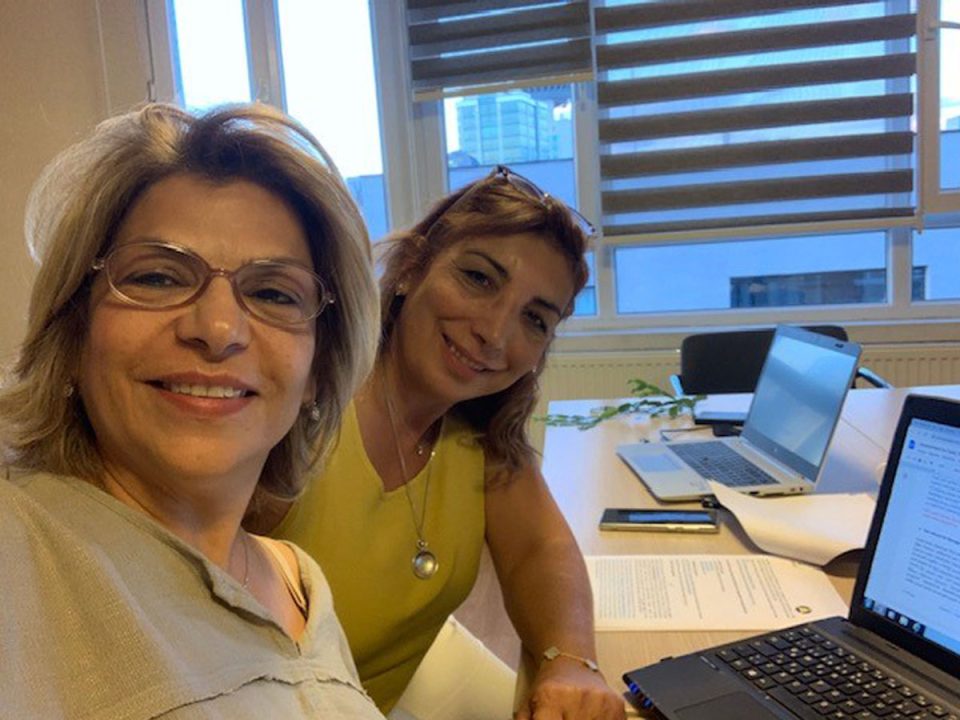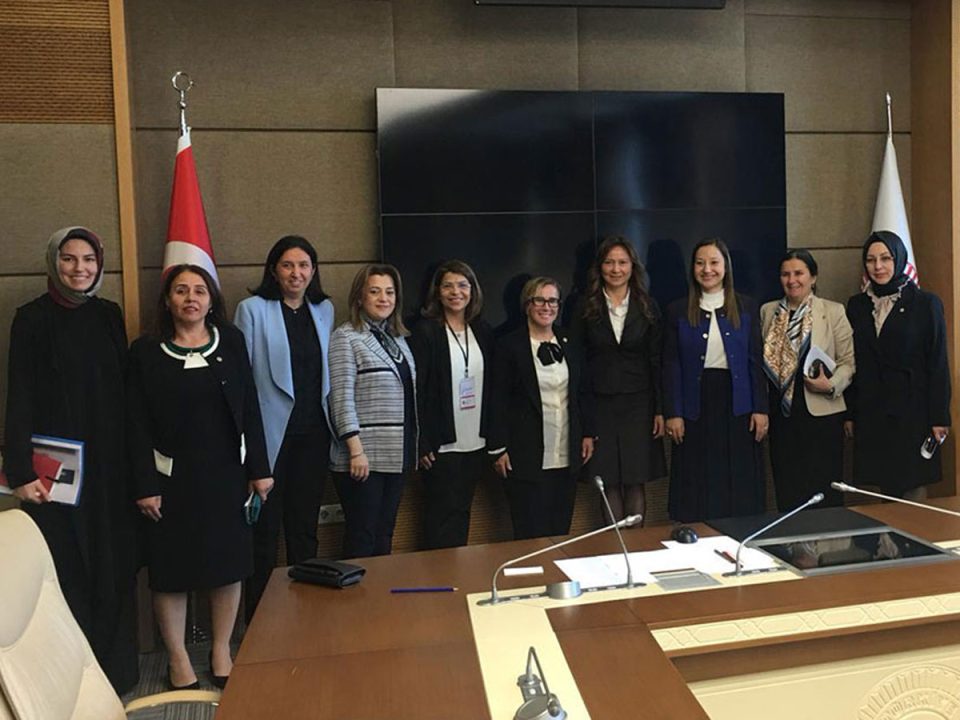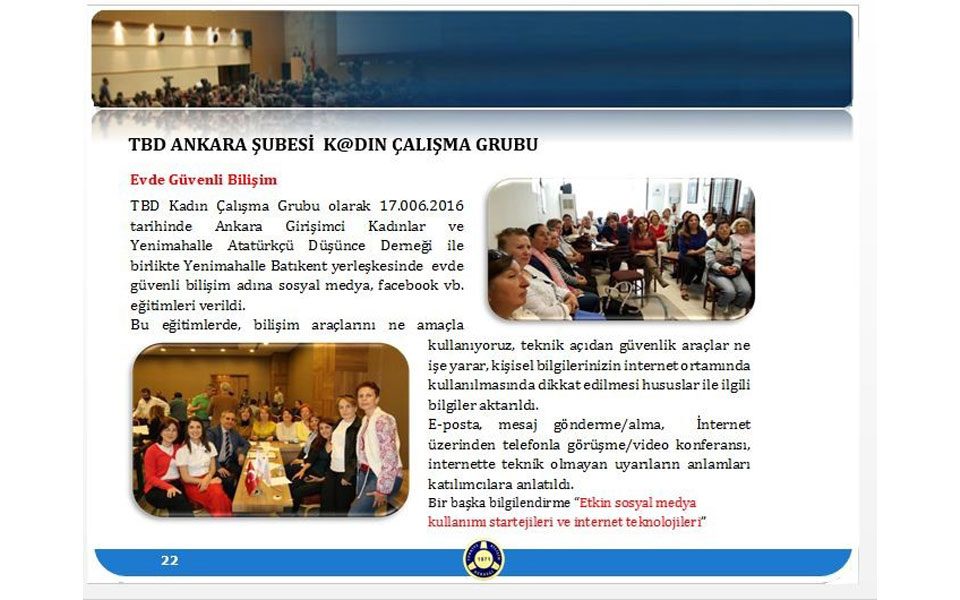
Concept note for the International Celebration
April 22ND at 16 pm CEST
External draft
09.04.21
Background
While girls across the world tend to outperform boys in reading and writing skills, they continue to be under-represented amongst top performers in Science Technology Engineering Arts and Mathematics (STEAM).
With more support towards education and skills training, let us encourage more girls and young women to actively pursue careers in STEAM to bridge the gender digital divide.
Founded by ITU in 2011, over 377,000 girls and young women have taken part in more than 11,400 International Girls in ICT Day celebrations in 171 countries.
Governments, national ICT regulatory authorities, ICT companies, academic institutions, UN agencies, and NGOs across the world are all encouraged to join the movement and celebrate International Girls in ICT Day. Over the years, the communication campaign has reached over 1 million stakeholders.
“Connected Girls: Creating Brighter Futures”
High-Level Panel
Organized by ITU, the Royal Academy of Science International Trust (RASIT), and OsloMET; and supported by Generation Equality
This year’s Girls in ICT Day marks its 10th Anniversary celebration, with the theme of “Connected Girls; Creating Brighter Futures.” Traditionally celebrated on the fourth Thursday of April, this year falling on April 22nd, the Girls in ICTs celebrations for this special 10th anniversary will follow 10 moments, highlighting some of the relevant stakeholders, industries, and actions involved in the effort to promote girls in the field of technology. The moments will also follow the SDGs in focus under the High-Level Political Forum for the SDGs in 2021, including SDG 1 on no poverty, 2 on zero hunger, 3 on good health and well-being, 8 on decent work and economic growth, 10 on reduced inequalities, 12 on responsible consumption and production, 13 on climate action, 16 on peace, justice and strong institutions, and 17 on partnerships.
This panel, held on the International Girls in ICT Day, represents the 3rd moment of this year’s programming; Dialogue and Conversation. Comprised of panelists from different agencies, international organizations, member states, civil society, academia, and the private sector, the panel will address the topics highlighted in the blueprint of the Action Coalition on Innovation and Technology of the Generation Equality Forum while highlighting the RASIT Girls in Science for SDGs International Platform, in an effort to create a comprehensive dialogue around the mission of empowering Girls in ICT. In line with the theme of this year’s celebrations, this event will be available in the six UN languages to promote widespread audience accessibility.
Expected outcomes
The expected outcomes of the panel will be
– Build momentum and awareness about the importance of encouraging girls in STEAM and Generation Equality,
– Engage key stakeholders and communities in the promotion of this mission,
– Acknowledge and build upon the progress of the RASIT Girls in Science for SDGs International Platform,
– And cultivate an inclusive dialogue to discuss some key themes in encouraging girls to pursue STEAM careers.
Target Audience
This session will be open to external participants and the entire online community. Some of the key stakeholders that will be targeted/invited to the sessions include: ITU members, International Organizations and UN Sister Agencies, International financial institutions, development organizations, private sector stakeholders balanced across major relevant industry sectors, policymakers, Ministers of ICT, Education, Economy, Youth, Science, Technology and Innovation, youth organizations, civil society and academia leaders in an effort to promote widespread global cooperation and initiatives in pursuit of the mission of providing opportunities for girls to advance in the field of technology. Likewise, young girls all over the world are encouraged to join the event in order to garner inspiration, motivation, and empowerment to pursue careers in the field of technology.
Communication
UN Youth Envoy – Role to be determined
Therese to add
High-Level Panel Format
1. Type: Virtual session over Zoom platform. Available in the six UN languages
2. Duration: 1.5 hours
3. Format: Interactive High-Level Panel followed by discussion/TV Show format. The session will be held in the form of an Interactive high-level panel. The moderators will address specific questions to each of the High-level speakers that will be invited to the session (some of them will be partnered with beneficiaries/end users).
Proposed Panelists and Event Flow:
Remarks from Doreen (2 minutes)
PGA/ITU SG (4 minutes)
Princess (4 minutes)
UN Women ED Phumzile Mlambo-Ngcuka (4 minutes)
Video from young girls on Connecting the UNConnected The power of Girls in ICTs Girls representative from the Platform (Africa, China, India, Europe etc.) (2 minutes)
– Co-moderators: ITU Ms. Bogdan Martin and Ms. Salma Alrowaei, Communication and ICT Officer, Girls in Science 4 SDGs International Platform (Saudi Arabia)
1. First Mini Dialogue on inclusive, equal access and use of ICTs for girls (10 min)
Discussion to emphasize need for inclusivity as a means for innovation in ICTs – success stories to be spotlighted
Speakers:
– H.E. Prof. Ameenah Gurib-Fakim, 6th President of the Republic of Mauritius
– Dr. Mona Minkara, Assistant Professor, Northeastern University; Director of RASIT Writing Science in Braille Global Campaign (3 minutes)
– Dr. Anthony Giannoumis, Associate Professor at OsloMET, Vice Rapporteur for the subcommittee on ICT Accessibility and Access Coalition Liaison for EQUALS (3 minutes)
Mini Dialogue format
o Ms. Eve K. Umutoni (English) and Ms. Salma Jaafari (French) (Girls in Science 4 SDGs) to read a one-minute statement on the need for inclusivity as a means for innovation in ICTs
o Co-moderators to ask speakers “How has your experience shaped your view of the need for inclusivity, diversity, and equal access to ICTs in cultivating innovation?
o The co-moderators can then introduce the second topic of the mini dialogue [slide w/ next speakers]
2. Second Mini Dialogue on types of partnerships (10 min)
Discussion to emphasize public-private partnerships, partnering with international institutions, etc.
Speaker:
– Ms. Ceyda Suer, Government Relations, Vodafone, Turkey
– Ms. Beeta Ehdaie, Senior Advisor, US Department of State
– Mr. John Kim, Managing Partner, Amasia
Mini Dialogue format
o Ms. Diana (Russian) and Ms. Victoria Ballesteros-Gonzalez (Spanish) to read a one minute statement to emphasize how partnerships can assist in the mission of promoting girls in ICTs
o Co-moderators to ask speaker one question;
▪ “What are the different types of partnerships that can be leveraged in promoting girls in ICTs, and how can these partnerships best be leveraged?”
o The co-moderators can then introduce the third topic of the mini dialogue
3. Third Mini Dialogue on concrete measures to be taken (10 min)
Discussion to emphasize the need for partnership and empowerment from all sides – all genders, public, private, startup, international institutions
Speakers:
– HRH Prince Zain El-Hashemite, Founder of Y4X Global Initiative for Equality in STI
– Ms. Iva Gumnishka, CEO, Humans in the Loop | Forbes 30 under 30
– Ms. Priya Samant, Impact Adviser and Director, Sequoia Applied Technologies
Mini Dialogue format
o Ms. Yuling Li (Chinese) and Ms. Anwar Mikdad (Arabic) to read a one minute statement on the importance of empowering young girls in the entrepreneurship sphere
o Co-moderators to ask speakers;
▪ “What is the role of global cooperation in empowering girls in ICTs?”
o The co-moderators can then give a quick thank you to all the speakers of the five mini-dialogues and (re)introduce the final speakers for the conclusion of the event
Beyond Boundaries: Equality in ICT for Creative Economy
(1 minute) Speaker: Ms. Polona Šafarič Tepeš, PhD student in Cancer Biology; Interdisciplinary Doctoral Programme in Biomedicine In collaboration with Cold Spring Harbor Laboratory, Slovenia
(2 minutes) Speaker: Ms. Hamisha Daryani Ahuja, Executive Producer, Forever 7 Entertainment Ltd
(2 minutes) Speaker: Representative from Finland
Musical Performance: (3 minutes)
Mr. Danilo Segovia, Ph.D. candidate, Stony Brook University and Cold Spring Harbor
Laboratory (Uruguay) – Clarinet
Ms. Sara Boyle, Ph.D. candidate, Cold Spring Harbor Laboratory, (USA) – Violin
Ms. Yuling Li, (China) – Guzheng Traditional Instrument
Speakers (5 minutes): Hoda Kanso (Lebanon) University student and activist in Public Health and ICT to Fight the Fakes; peer-mentor for the Girls in Science 4 SDGs International Platform;
Alma Nordenstam (Sweden) a medical student, peer-mentor for the Girls in Science Platform, and global health enthusiast with a special interest in sustainable solutions to health policy.
Q&A Session (25 minutes)
Concluding Remarks from Co-Moderators (5 minutes)



